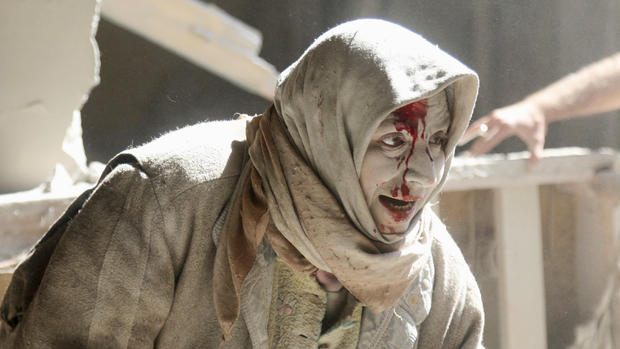Obama reveals the one question every world leader asks him
Efforts to solve the five-year Syrian civil war reached a new roadblock Monday when opposition representatives pulled out of the talks in Geneva. Increased fighting in Syria in recent days indicates a possible crumbling of the partial cease-fire, brokered by the United States and Russia in February.
On Monday President Obama and Russian President Vladimir Putin spoke by phone about the crisis.
"Is there a coming together in terms of ideas about peace and the ceasefire and who can do what to make Syria a better place?" "CBS This Morning" co-host Charlie Rose asked Mr. Obama in an interview at the White House, soon after the leaders' conversation.
"My call today to him was to indicate that we're starting to see it fray more rapidly. And if the United States and Russia are not in sync about maintaining it and getting a political track and transition moving, then we could be back in a situation we were three, four weeks ago. And that would serve neither of our interests," Mr. Obama explained.
He added that he thinks the Russians are also "very much committed to maintaining the structure of the Syrian state, which in theory, we don't object to either."
"Where we have continually butted heads -- and this has been true for six years now -- is his insistence that he cannot back unilaterally the removal of [Syrian President Bashar al-Assad] -- that that's a decision that Assad and the Syrians have to make," he said.
- Obama weighs in on 28 classified pages of 9/11 report
- Obama expects progress in battle against ISIS in Mosul by end of year
In the last year of his two-term presidency, Mr. Obama also reflected on his foreign policy doctrine, which he said he has "always shied away from labeling" under one banner.
"What I believe is that the United States as the world's singular super power has an obligation in all areas of the world, where there's mayhem and war and conflict, for us to try to be a positive force," Mr. Obama said. "But that does not mean that we should be deploying troops everywhere where a crisis is taking place, that we have to be judicious about how we use military power."
However, some have criticized the president for thinking too much and not doing enough. Mr. Obama acknowledged he had heard that argument.
"When we sat down together back in 2009 when I first came into office, we were still in the midst of two active wars," Mr. Obama told Rose. "And since that time, we've been able to wind down active combat in those two theaters. Those countries are by no means in great shape. ... Al Qaeda at core has been dismantled. Bin Laden is dead. ISIL is losing territory. And so I've shown no hesitance to use our military where necessary to protect American lives, American interests."
In 2012, Mr. Obama said Assad regime's use of chemical weapons would be the "red line" that could move the U.S. closer to military intervention in the Syrian civil war. But he was criticized again for not attacking Assad directly, which some say resulted in the country's current devastated state where hundreds of thousands of people have died in the civil war.
"I think there's no doubt that there are many in the Middle East who would've preferred me taking a shot at Assad," Mr. Obama said in response to the criticism. "But the reason is not because of some abstract notions of red lines. ... Assad is a horrible leader, horrible dictator who has shattered his country. And it continues to be our position that we need to get him out of there."
"You have said more than one time that we're the strongest military, we have the best economy. You've mentioned the culture ... America should own the 21st century -- your words. What could stop us?" Rose asked.
"Well, a couple things could stop us," Mr. Obama said. "Number one is if our political system continues to be dysfunctional. It's fascinating the degree to which the single most important question I'm asked these days from other world leaders is, 'What's going on with your elections?' ... The current presidential election just is the tip of a broader iceberg of dysfunction that we've seen."
As the president reflected on what he has learned during his presidency, he shared that "big breakthroughs are typically the result of just a lot of grunt work."
"There's a lot of just blocking and tackling. ... What is important is making sure that you've got an organization that has integrity, that is clear about its mission, that is doing things the right way and not taking shortcuts," Mr. Obama said. "That you're not thinking in terms of short term politics or PR, but you're in for the long haul, and when you do that, than ultimately, you're going to get the good outcome."
